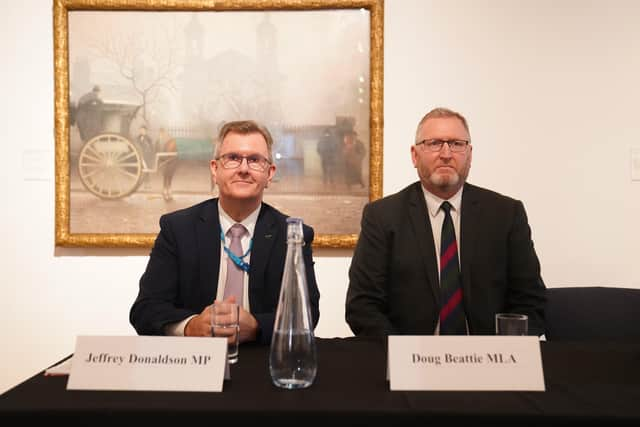Owen Polley: Voters in the Stormont election will be turned off by unionist infighting


It’s likely to be an angry, divisive campaign, dominated by arguments over the Northern Ireland Protocol. The parties have already argued furiously over the DUP’s decision to collapse the Executive, with the issue only fading into the background due to Vladimir Putin’s decision to invade Ukraine.
Even so, the DUP and the UUP spent much of last week trading accusations and recriminations.
Advertisement
Hide AdAdvertisement
Hide AdTheir dispute did not involve Russia, or even the protocol. Instead, they were squabbling over who knows what the DUP leader, Sir Jeffrey Donaldson, did (or didn’t do) last summer.
Recently, the Nolan Show alleged that Sir Jeffrey discussed re-joining the UUP, after initially losing the contest to become DUP leader to the agriculture minister, Edwin Poots.
Donaldson was once one of the Ulster Unionists’ brightest young stars and seemed a likely successor to David Trimble. Like other promising UUP politicians, including Arlene Foster, he fell out with the party leadership over the Belfast Agreement.
Subsequently, Donaldson became an influential member of the DUP, taking a key strategic role and holding vital posts at Stormont and Westminster. In the leadership battle with Edwin Poots, he was viewed as the more moderate candidate, and lost by the narrowest possible margin.
Advertisement
Hide AdAdvertisement
Hide AdOf course, the twist in that story was that Mr Poots was in place for little more than a month, before a new leadership election took place.
Donaldson, whose political career had appeared to be in serious trouble, won that contest unanimously, with no other candidates taking part. But the DUP seemed to be in disarray, after disposing of both Mrs Foster and Mr Poots in a matter of weeks.
Over the intervening months, its results in opinion polls have gradually stabilised. The party’s reaction to the protocol remained unconvincing, drawing criticism from unionist opponents, but the appearance of anarchy and division in its ranks was receding.
There is a feeling that that perception is threatened by the revelation that Donaldson held talks with UUP leader, Doug Beattie. Sir Jeffrey claims that he was asked to rejoin his old party but politely declined, taking the opportunity to discuss unionist cooperation instead. Beattie says that the meeting was specifically focussed on Donaldson’s potential defection, implying that the DUP leader took the offer more seriously than he will now admit.
Advertisement
Hide AdAdvertisement
Hide AdMore than a week after the Nolan Show broadcast, it is unclear where the two leaders are going with this dispute. Their accounts of the meeting are different, but there is hardly a radical disagreement, given that Sir Jeffrey admits he was asked to rejoin the UUP.
It seems that Beattie has inferred that Donaldson called his integrity into question, by downplaying the idea that he considered defecting.
The UUP may feel that it can undermine the DUP, by encouraging the idea that its leader lacks loyalty to his party.
At the same time, Beattie will soon embark on an election campaign where his task is, at least in part, to persuade voters that he is a better option than Donaldson to lead Northern Ireland. If the DUP leader is not the sort of person whom unionists should support, then why did the UUP try to poach him from its rival?
Advertisement
Hide AdAdvertisement
Hide AdThe history between the two parties is certainly acrimonious. The DUP attacked the UUP relentlessly for signing the Belfast Agreement, using grassroots unhappiness with prisoner releases and other controversial issues to become the largest unionist party.
Donaldson’s defection to the DUP, like that of Arlene Foster, made voting for Ian Paisley’s party more acceptable to moderate unionists. It was a decisive blow.
When Poots initially succeeded Mrs Foster, the UUP probably hoped that its rival would repudiate relative modernisation and return to its roots as a party of protest and deep religious conviction. Some Ulster Unionists believed that, almost by default, they would become the natural home for moderate pro-Union voters put off by any DUP retreat to fundamentalism and traditionalism.
Doug Beattie has continued to present the UUP as a liberal alternative that embraces feminism, LGBT issues and other ‘progressive’ causes. The polls suggest that he is relatively popular, even in the face of recent controversies about inappropriate tweets.
Advertisement
Hide AdAdvertisement
Hide AdDespite Beattie’s attempts to encourage the idea of a UUP comeback, though, the party has notably struggled to attract defectors of the calibre of Sir Jeffrey. Instead, its most prominent recruits are ex-PUP politicians and a former Irish senator with a questionable attitude to the Northern Ireland Protocol.
The latest intra-unionist spat, which may seem important to the two leaders personally, could prove a turn-off for prospective voters, with so many other urgent issues looming.
All the pro-Union parties agree that the protocol undermines Northern Ireland’s place in the United Kingdom and must be changed. Their time and energies should surely be consumed with coming up with lasting solutions to the Irish Sea border.